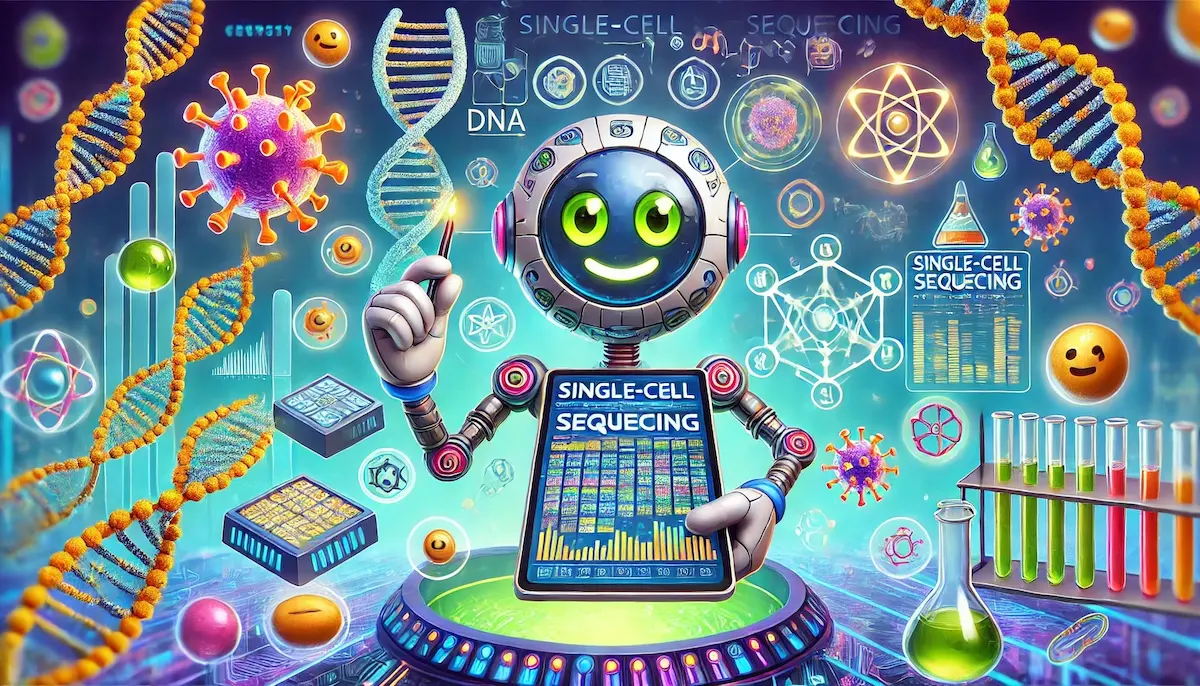Single-cell sequencing is a groundbreaking technology that allows scientists to analyze the genetic material of individual cells. Unlike traditional sequencing methods that average the genetic information from thousands or millions of cells, single-cell sequencing provides a detailed view of the unique genetic and molecular characteristics of each cell. This technology is transforming our understanding of biology, revealing the complexity of cellular diversity within tissues and uncovering the mechanisms driving development, disease, and other biological processes.
The Basics of Single-cell Sequencing
Single-cell sequencing involves isolating individual cells from a tissue or organism, extracting their genetic material (DNA or RNA), and then sequencing it to generate data on the genetic and molecular makeup of each cell. There are several types of single-cell sequencing, each focusing on different aspects of cellular function:
- Single-cell RNA sequencing (scRNA-seq): This method profiles the transcriptome, the complete set of RNA transcripts produced by a cell. It provides insights into gene expression patterns, revealing which genes are active and how their expression levels vary between cells.
- Single-cell DNA sequencing: This technique sequences the entire genome of individual cells, allowing researchers to study genetic variations, such as mutations, copy number variations, and chromosomal rearrangements, at the single-cell level.
- Single-cell ATAC-seq: Assay for Transposase-Accessible Chromatin using sequencing (ATAC-seq) is used to study chromatin accessibility, which indicates regions of the genome that are open for transcription and thus active. This method provides information about gene regulation and how it differs between cells.
- Single-cell multiomics: This approach combines multiple types of data from the same cell, such as RNA expression, DNA methylation, and chromatin accessibility, providing a more comprehensive view of cellular function.
Applications of Single-cell Sequencing
Single-cell sequencing has a wide range of applications across various fields of biology and medicine:
Understanding Cellular Diversity
One of the most significant contributions of single-cell sequencing is its ability to reveal the diversity of cell types within a tissue. Traditional sequencing methods mask this diversity by averaging the data from all cells, but single-cell sequencing uncovers the distinct molecular signatures of individual cells. This has led to the discovery of new cell types and states, as well as a deeper understanding of how cells differentiate and specialize during development.
Insights into Development and Differentiation
Single-cell sequencing is particularly valuable in developmental biology, where it is used to study how cells evolve from a single fertilized egg into a complex organism with diverse cell types. By analyzing the gene expression patterns of individual cells at different stages of development, researchers can map the trajectories of cell differentiation and identify the regulatory networks that guide this process.
Cancer Research
In cancer research, single-cell sequencing is helping to unravel the complexity of tumors, which are often composed of a heterogeneous mix of cancerous and non-cancerous cells. By profiling individual cells within a tumor, researchers can identify subpopulations of cancer cells with distinct genetic mutations, expression patterns, and drug sensitivities. This information is crucial for understanding tumor evolution, identifying potential therapeutic targets, and developing personalized cancer treatments.
Immunology and Infectious Diseases
Single-cell sequencing is also transforming immunology by providing detailed insights into the immune system. By analyzing individual immune cells, researchers can study the diversity of immune responses, track the development of immune cell populations, and identify rare immune cell types involved in disease. This approach is being used to study infectious diseases, autoimmune disorders, and vaccine responses, leading to new strategies for diagnosing and treating these conditions.
Neuroscience
In neuroscience, single-cell sequencing is being used to explore the cellular complexity of the brain. The brain contains a vast array of neuron types and glial cells, each with unique functions. Single-cell sequencing allows researchers to map the molecular profiles of these cells, providing insights into brain development, function, and disorders such as Alzheimer’s disease, autism, and schizophrenia.
The Future of Single-cell Sequencing
The field of single-cell sequencing is rapidly advancing, driven by improvements in technology and bioinformatics tools. As sequencing costs continue to decrease and methods become more refined, it will be possible to analyze larger numbers of cells with greater accuracy and depth. This will enable more comprehensive studies of cellular diversity and function across a wide range of organisms and tissues.
One exciting development is the integration of single-cell sequencing with spatial transcriptomics, which allows researchers to map gene expression patterns within the spatial context of a tissue. This combination of spatial and molecular data provides a more detailed understanding of how cells interact within their native environments.
Additionally, single-cell multiomics is expected to grow, offering even deeper insights by combining different types of molecular data from the same cell. This holistic approach will help to unravel the complex regulatory networks that govern cellular behavior.
As single-cell sequencing continues to evolve, it will remain a powerful tool for advancing our understanding of biology and medicine. The insights gained from this technology have the potential to revolutionize fields such as cancer research, immunology, and neuroscience, leading to new treatments and therapies for a wide range of diseases.
Blockfine thanks you for reading and hopes you found this article helpful.
